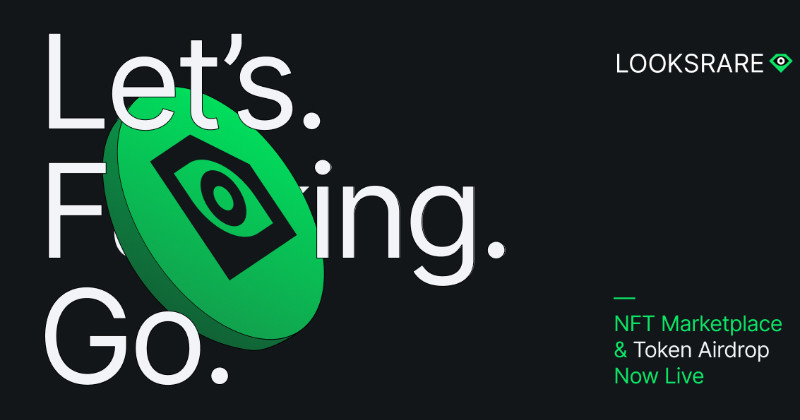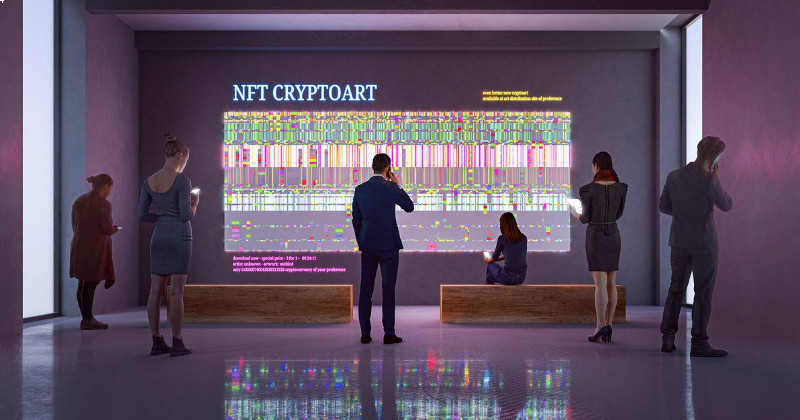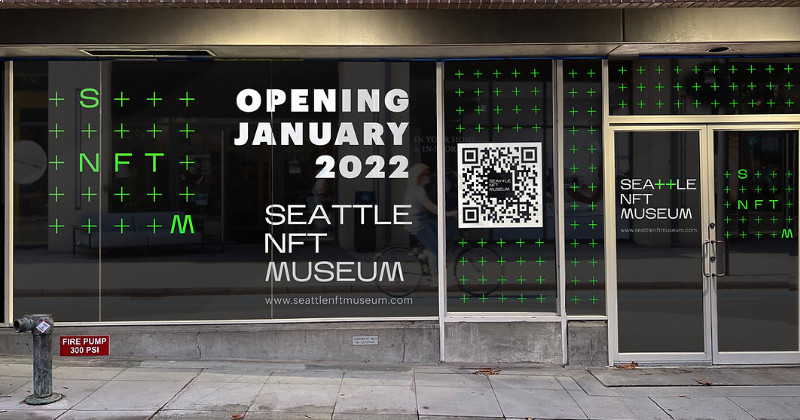Is the long-awaited decentralized OpenSea finally here or is LooksRare propped up by wash trading?
- Donald Trump Makes a Splash in NFT Arena, Releases 45,000 Fantasy NFTs
- Maharashtra Government to Use NFT Tech to Store Health Data, Partners With Algorand Blockchain
- People are fraudulently driving up NFT prices by buying their own work
After months of speculation about a possible vampire attack, dominant NFT marketplace OpenSea may finally have a worthy – and more thoroughly decentralized – competitor: LooksRare.
According to a Dune Analytics dashboard, in the past 24 hours the fledgling non-fungible token marketplace has hosted $105 million in trading volume, generating 613 ETH (nearly $2 million) in platform fees to be distributed to LOOKS token stakers in the coming hours, according to pseudonymous co-founder Zodd:
OpenSea, meanwhile – the dominant force in NFTs, often commanding in excess of 90% of the sector’s total trading volume – saw $169 million in volume on Monday and is narrowly keeping pace with LooksRare on Tuesday, also with $105 million in sales.
So far, traders are betting LooksRare has at least temporary staying power. Over 75,000 Ethereum addresses have claimed a LOOKS airdrop worth an average of $3,500, and the token is on the precipice of breaking the top 200 cryptocurrencies by market cap, up 38% on the day to $3.58.
The numbers point to a searing-hot start for a day-old platform that seems to fill a clear market demand. For months, NFT traders have clamored for OpenSea to release a token and decentralize portions of its operations. The incumbent’s policies around enforcing IP as well as delisting hacked or exploited NFTs has made it a target of critics who say it’s a rent-seeking middleman in a decentralized ecosystem. The firm was recently valued at $13.3 billion.
Looking past the flashy numbers, however, there may be signs that LooksRare’s surge could soon ebb – specifically, that a large portion of its remarkable volume is attributable to traders “wash trading” in order to farm platform token rewards.
The question is: Will traders return to OpenSea if token incentives can’t keep them around?
Favorable conditions
In many ways, LooksRare had the good fortune of launching at an unusually opportune time.
OpenSea has recently been a popular punching bag for critics, both within and without the crypto community. For months ideologically motivated users have griped about 2.5% platform fees routed to OpenSea’s team rather than to users, the lack of a token and about the marketplace’s at times patchwork enforcement of intellectual property claims.
Additionally, OpenSea’s opaque policies around delisting hacked or exploit items has become a target for critics of Web 3, such as Signal founder Moxie Marlinspike, who argue that the emerging technological movement’s claims to decentralization are undermined by reliance on centralized third parties.
These conditions prompted observers to ponder whether a competitor could take OpenSea’s crown via a “vampire attack” multiple times over the past year – a term for an effort to sap volume from an incumbent protocol via superior incentives often seen in decentralized finance (DeFi). Previous efforts, such as prolific developer Andre Cronje’s open-source Artion marketplace, have largely failed to put a dent in the multibillion-dollar NFT behemoth, however.
In addition to the narrative tailwinds supporting a push from a decentralized alternative like LooksRare, market conditions also currently favor the platform’s launch.
Amid a broader crypto market rout, NFTs are showing impressive signs of strength, mirroring a 2021 June-through-August summer dip that saw Ethereum pull back as much as 50% while NFTs reached the peak of their mania.
Indeed, according to a Dune Analytics dashboard, December was the highest sales volume month for OpenSea since August, and “floor prices,” or the lowest price at which a NFT from a collection can be bought, have rebounded for major collections like CryptoPunks, which are up nearly 20% off November lows.
Wash trading?
While conditions appear right for the platform’s launch, LooksRare’s early success isn’t entirely attributable to natural demand.
As multiple observers have pointed out, a large portion of LooksRare’s volume is likely being generated from wash trading, which refers to the practice of wallets typically controlled by the same party “selling” assets back and forth.
Currently, the protocol is rewarding buyers and sellers with 2,866,500 LOOKS tokens (over $10 million) per day based on volumes traded and will continue to do so for the next 30 days before progressively cutting emissions, according to the documentation.
Collections without royalty fees, such as Larva Labs’ Meebits, are among the most popular, with many “floor” Meebits generally worth 3.5 ETH or lower trading for as much as 30 ETH.
However, the team has warned that attempting to game the rewards in this manner could quickly turn unprofitable because the 2% platform fee incurred during wash trades may outstrip rewards earned.
“Each trade on LooksRare (except for private sales) incurs a platform fee of 2%, and typically a royalty fee of between 5%-10%. The total LOOKS rewards for trading each day are also fixed, and distributed based on traders’ contribution to total trading volume, meaning that there’s no guarantee of the amount of rewards that a wash trader could earn in a day,” reads the documentation.
As with many “liquidity mining” schemes, where platforms reward users for providing liquidity and activity, it remains to be seen whether LooksRare’s volume will remain sticky as the LOOKS rewards spigot turns to a trickle in the coming months.
Source: coindesk.com






